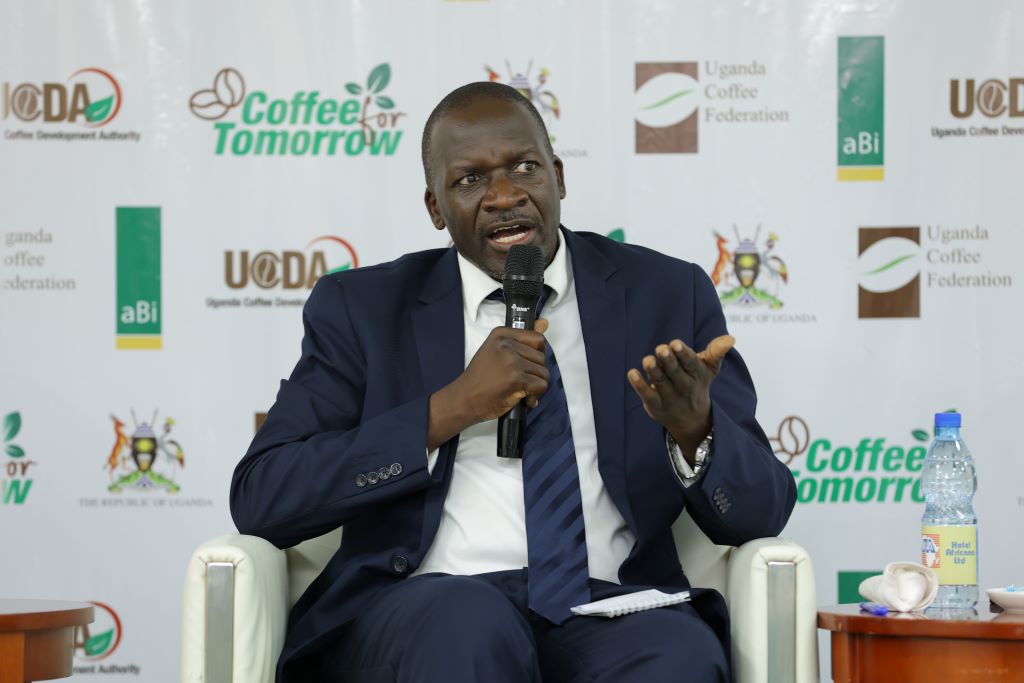
Uganda’s Coffee Industry gears up for EU Deforestation Regulation
Mr. Gerald Kyalo, Director of Development Services at UCDA, shares his expertise on EUDR compliance during a panel discussion at the breakfast meeting.
KAMPALA, UGANDA – The Uganda Coffee Development Authority (UCDA) and the National Task Force held a crucial meeting with journalists to discuss the upcoming European Union’s Deforestation Regulation (EUDR) and Uganda’s preparedness to comply.
The meeting held at Hotel Africana on Tuesday, September 3, 2024 was part of national efforts to engage stakeholders and raise awareness about EUDR compliance.
Mr. Robert Nangatsa, an Extension Manager at UCDA briefed the media on the nationwide registration drive for coffee farmers, aimed at streamlining exports and ensuring compliance with EUDR.
“The EU market is crucial for Uganda’s coffee industry, accounting for approximately 60% of our exports. It is imperative that we comply with the EUDR to maintain access to this market,” said Mr. Nangatsa.
He explained that the EUDR requires exporters to submit detailed land-use maps and due diligence statements to ensure deforestation-free production. “This means that we must provide geographic coordinates of production plots to ensure traceability and verify deforestation-free practices,” he added.
The EU regulation is in sync with the Uganda National Coffee Act 2021 which stresses the need for traceability in the coffee sub-sector. Even before the EUDR came into force, UCDA had developed a Geospatial Monitoring and Evaluation System and Farmer Registration App to register farmers and other value chain actors. “These innovative tools will empower coffee exporters to adhere to EUDR regulations and ensure the sustainability of our coffee sector,” said Nangatsa. Registration of value chain actors is necessary for traceability of coffee along the entire value chain.
A dedicated unit has been established to oversee the implementation process. Nangatsa said that UCDA is working closely with the Private Sector, MDAs, and other stakeholders to ensure a seamless implementation of EUDR regulations.
The authority has also organised national-level workshops to raise awareness among private sector stakeholders. “We believe that awareness and capacity building are critical components of our compliance strategy,” said Nangatsa.
He told journalists that UCDA is conducting market research to integrate the EUDR module with the Geospatial M&E System.
“This will ensure comprehensive compliance and streamlined operations,” said Nangatsa.
UCDA emphasised the need for concerted efforts in registering all coffee value chain actors and mapping coffee farms to ensure continued access to the EU market. “We urge all stakeholders to support the implementation of a comprehensive traceability system,” said Nangatsa.
Dr. Gerald Kyalo, UCDA’s Director Development Services, emphasized the importance of registration for traceability and EU market access.
“The registration process is meant for traceability and making sure our coffee accesses the EU market. We must be able to trace our coffee.”
Dr. Kyalo explained that registration involves capturing farm geo-locations and farmer details to ensure traceability. “The registration is for traceability to know where your farm is located and how big it is. This will help in tracing the farm where a certain batch of export is coming from,” he told reporters.
For farmers with 10+ acres, polygons of their farms will be created for record purposes, enabling easy tracing of exported coffee. “As long as you have 10 acres and above, we shall take polygons of the garden. We take different coordinates and end up with polygons. For those below 10 acres, coordinates will be enough.”
Kyalo noted that registration will be an ongoing process to accommodate new entrants into the coffee value chain. “The registration process will be continuous and done by UCDA. Our officers will update the register annually to include new farmers.”
He stressed that the EU regulation requires evidence of no deforestation, which necessitates tracing coffee back to the farmer. “The regulation requires that we show evidence that our coffee doesn’t contribute to deforestation. To do this, we need to trace our coffee back to the farmer and have a register of all farmers, gardens, and coordinates.”
Mr. Samson Emong, representing the National EUDR Task Force, emphasised the critical need for accurate reporting on the campaign’s progress, stressing that Uganda’s coffee industry faces significant risks if it fails to meet the EU’s deforestation and sustainability standards.
The taskforce presented a comprehensive plan to achieve EUDR/CS3D compliance, including measures to enhance supply chain transparency, promote sustainable agriculture practices, and support smallholder farmers.
With the EU market accounting for a significant share of Uganda’s coffee exports, the industry’s compliance with EUDR is crucial to maintaining market access.
The National Taskforce has established a robust framework to support the industry’s transition, including capacity-building programs, awareness campaigns, and partnerships with key stakeholders.
Related
Uganda’s Coffee Industry gears up for EU Deforestation Regulation
News
Ugandan Citizen Abducted, Held in Secret Detention for Three Months, Sparks Outrage and Calls for Justice

A disturbing new case of unlawful detention has surfaced, highlighting the ongoing human rights crisis in Uganda. A Ugandan citizen was reportedly abducted and held in a secret facility, known as a “safe house,” for three months, only to be released without charge or explanation. This incident, reported by NTV Uganda, has sparked widespread condemnation and renewed calls for accountability regarding human rights abuses in the country.
While the details surrounding the abduction remain unclear, reports indicate that the individual was taken without due process and held incommunicado—an action that has long been condemned by human rights organizations. The victim’s release, with no charges filed and no clear justification, has angered activists and citizens, who view this as yet another case of egregious abuse of power by the state.
“This is a recurring pattern,” said one human rights activist. “Abductions, secret detentions, and unexplained releases have become all too common in Uganda. These acts violate fundamental human rights and erode public trust in the justice system.”
The use of “safe houses,” unregistered detention facilities reportedly operated by security forces, has been a focal point in numerous allegations of torture and illegal imprisonment. Despite repeated calls from both local and international organizations for their closure and accountability for those involved, little action has been taken to address these violations.
This case underscores the urgent need for reform within Uganda’s security apparatus and greater accountability for human rights abuses. Observers hope that drawing attention to these injustices will spur concrete action to bring those responsible to justice and ensure the protection of basic human rights.
As frustration mounts, calls for both domestic and international pressure to hold the government accountable for such crimes grow louder. “One day, there must be accountability for all these crimes against our people,” stated one social media user, reflecting the sentiments of many Ugandans.
News
NUP Gathering Disrupted: Kyagulanyi Alleges Security Force Harassment and Arrests

National Unity Platform (NUP) President Robert Kyagulanyi has accused Ugandan security forces of using excessive force to disrupt a planned NUP gathering. The allegations were detailed in a statement shared on Twitter, following an event held to honor children of NUP supporters who were killed, disappeared, or detained for their political beliefs.
According to Kyagulanyi, security personnel, under the command of an officer identified as Asiimwe, carried out a preemptive operation early in the morning upon learning of the NUP’s plans. The forces allegedly stormed the premises, arrested workers, and deployed tear gas to disperse those present.
“The criminals under the command of one Asiimwe deployed early morning, arrested our workers, and threw tear gas into our premises. They’ve cordoned off the premises and blocked all people from accessing the place,” Kyagulanyi wrote.
Among those reportedly arrested were Saava Peter, Mudenya Samson, and Turyasingura Samson. Kyagulanyi claimed the detained workers were subjected to beatings and interrogated about their political affiliations, with security operatives labeling them as terrorists.
“These JATT operatives asked the workers who they support politically, branding them terrorists and criminals—their only crime being that they work with us. You can imagine the indignity!” Kyagulanyi lamented.
This incident adds to the growing tension in Uganda’s political climate, where opposition parties frequently accuse the government of stifling dissent. Despite the challenges, Kyagulanyi ended his statement with a message of defiance and optimism, proclaiming, “UGANDA WILL BE FREE.”
NUP Gathering Disrupted: Kyagulanyi Alleges Security Force Harassment and Arrests
News
Sudan Demands Apology from Uganda Over Army Chief Muhoozi Kainerugaba’s Threat to Invade Khartoum

Sudan has demanded an official apology from Uganda over “offensive and dangerous” comments made by the chief of Uganda army staff, who threated to invade Khartoum, the Sudan Tribune has reported.
General Muhoozi Kainerugaba, son of Ugandan President Yoweri Museveni and CDF of the Ugandan army, posted two comments on the X platform on Tuesday in which he threatened “to capture Khartoum” with the support of the US President elect Donald Trump after he takes office. The posts were deleted later.
“The government of Sudan demands and official apology from the Ugandan government for the offensive and dangerous comments of the army commander,” Sudan’s foreign ministry said in a statement that the Sudan Tribune said it has seen.
Sudan Demands Apology from Uganda Over Army Chief Muhoozi Kainerugaba’s Threat to Invade Khartoum









